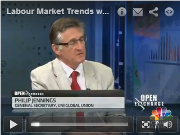Labour market trends in Africa

Jennings, speaking on CNBC Africa’s prime time breakfast news programme, “Open Exchange” live in Johannesburg, said the latest move by Walmart in the US to illegally crush the legitimate grievances of workers had been met by a new wave of strikes. He said Walmart’s actions were yet another warning for South Africa and the rest of the world.
“Walmart would be very foolish to try and do what they are doing in US in South Africa or anywhere else. We have organised Walmart in which ever market they have gone into but its always been with a struggle…for example this week was the first strike at Walmart in Brazil because of their ignorance of local labour market issues and the attempt to impose a US labour market model. And that’s the warning for everyone here in South Africa. You have problems of inequality and unfairness at work and people look to the US labour market as a model – it is not. The Walmart way of doing business is not going solve the development problems of South Africa.”
Jennings was asked how South Africa could gain a competitive edge.
“You can’t lay the blame on the labour movement. There are too may profound structural issues which have to be addressed here. It is not competitive to have 64% of your kids not making it to year 12. It is not competitive to have 5 million people under the age of 35 who cannot find work. You are not going to be competitive unless you have a proper industrial strategy to develop the skills of the workforce.”
Turning to Africa as a whole Jennings said the future was bright despite the challenges.
“There is massive potential in Africa and we are very optimistic about Africa going forward but you have got to get the soft bit of the economy right in terms of skills development and apprentiships. Learn from those good models, learn from the German model, learn from the Nordic model where they invest in the soft skills of their people to ensure that you have people ready for work. Employers everywhere say they cannot find skilled people, the people who have got the skills which will enable us to lift productivity. You have a productivity challenge in South Africa – it can be fixed – it can be resolved by working with the labour movement.”
Jennings said one of the most serious challenges facing Africa was the over reliance on the informal sector.
“Employment markets are skewed too much to the informal sector. When you look at distribution of employment where quality and decent work is – this is a minority of the population. Therefore we have to find a way of taking the informal into the formal sector. This will help boost aggregate demand and will lift the skills of the workforce.”
Jennings said he was confident that the trade union movement in Africa was heading in the right direction.
“The trade union movement in this continent is live and robust. They are facing enormous structural changes but they are reaching out to new members and growing… We are in the business of lifting all the boats. When we organise workers in an enterprise or in an industry we are trying to lift standards everywhere. This characterisation that we are only interested in a small group of employees is fundamentally wrong.”
Jennings concluded, “In every argument we make whether its at the G20 or with national governments or regional structures its about trying to put employment back on the agenda and argue about the quality of life of everybody.
We have levels of inequality the likes we have never seen before, a system of distribution of wealth which means that the wealth is flowing to the top. 20% of the population of South Africa have 70% of its wealth. The bottom 20% have 2.9% of the wealth. So to blame the people at the lower end for the economic malaise elsewhere is incorrect. We have to find a way to lift the boats at the lower end quicker than at the top.
There is going to be a wrestling match between us and there will be an argument about income distribution but income distribution is going wrong which is bad for demand in the economy, and the moral of the country. You have a malaise and feeling of marginalisation here, the situation is very combustible: Why? – because you have a third of the population not in work and you have highest levels of inequality anywhere. You address this with the labour movement and collective bargaining. I’m happy to sit down with any employer and find a fairer way of distributing the cake because that is not happening today.”
Watch the full interview here

